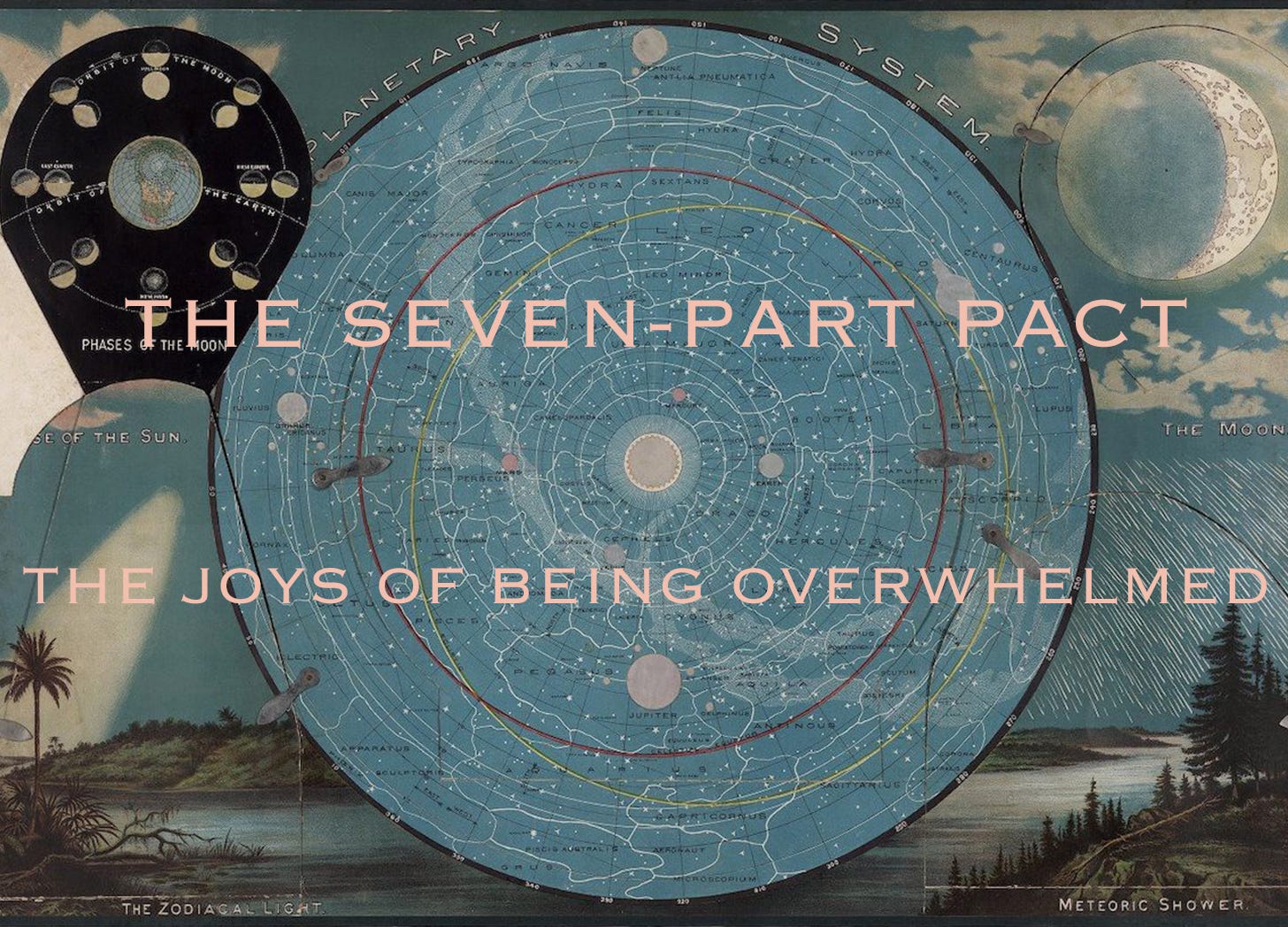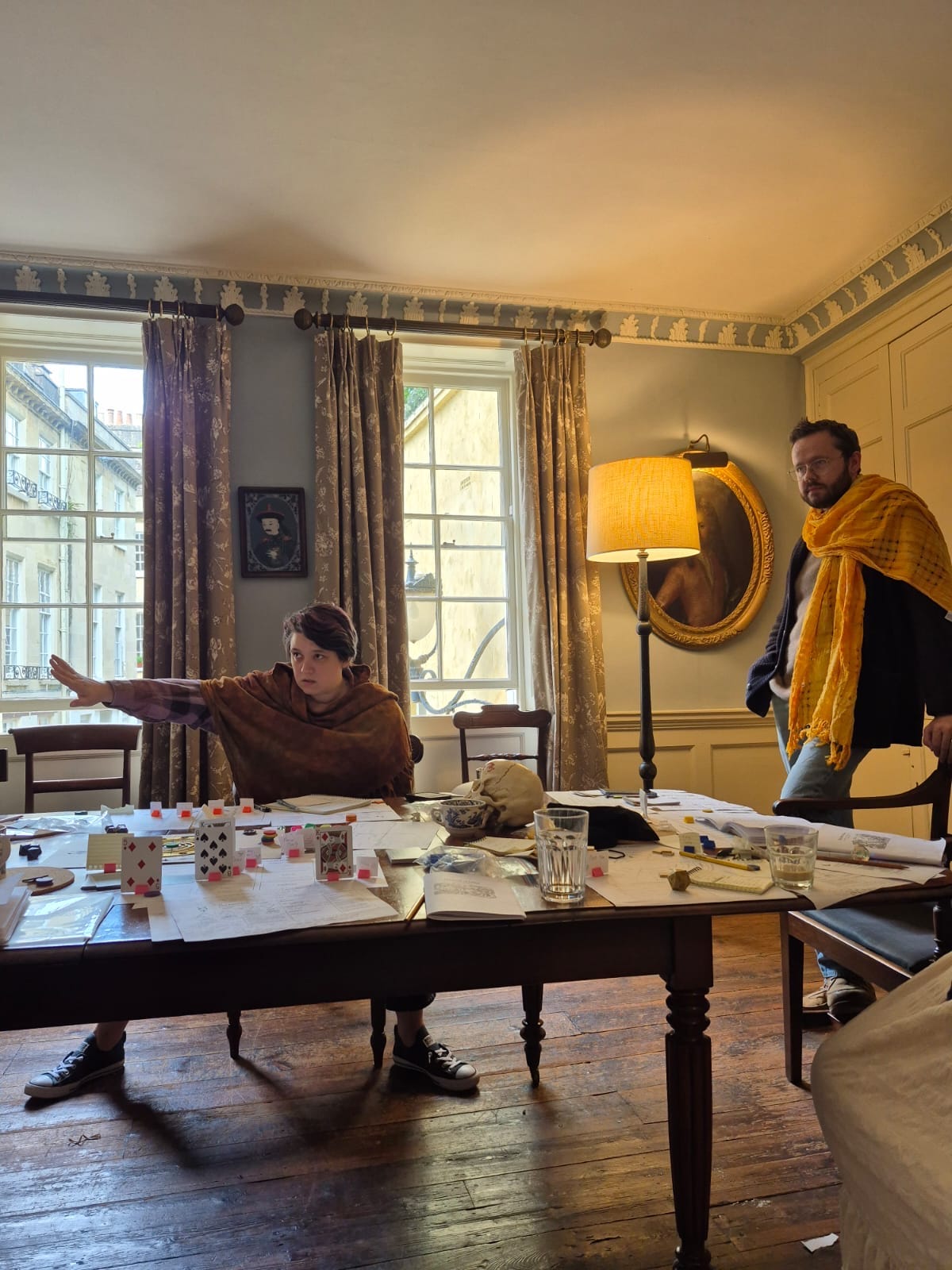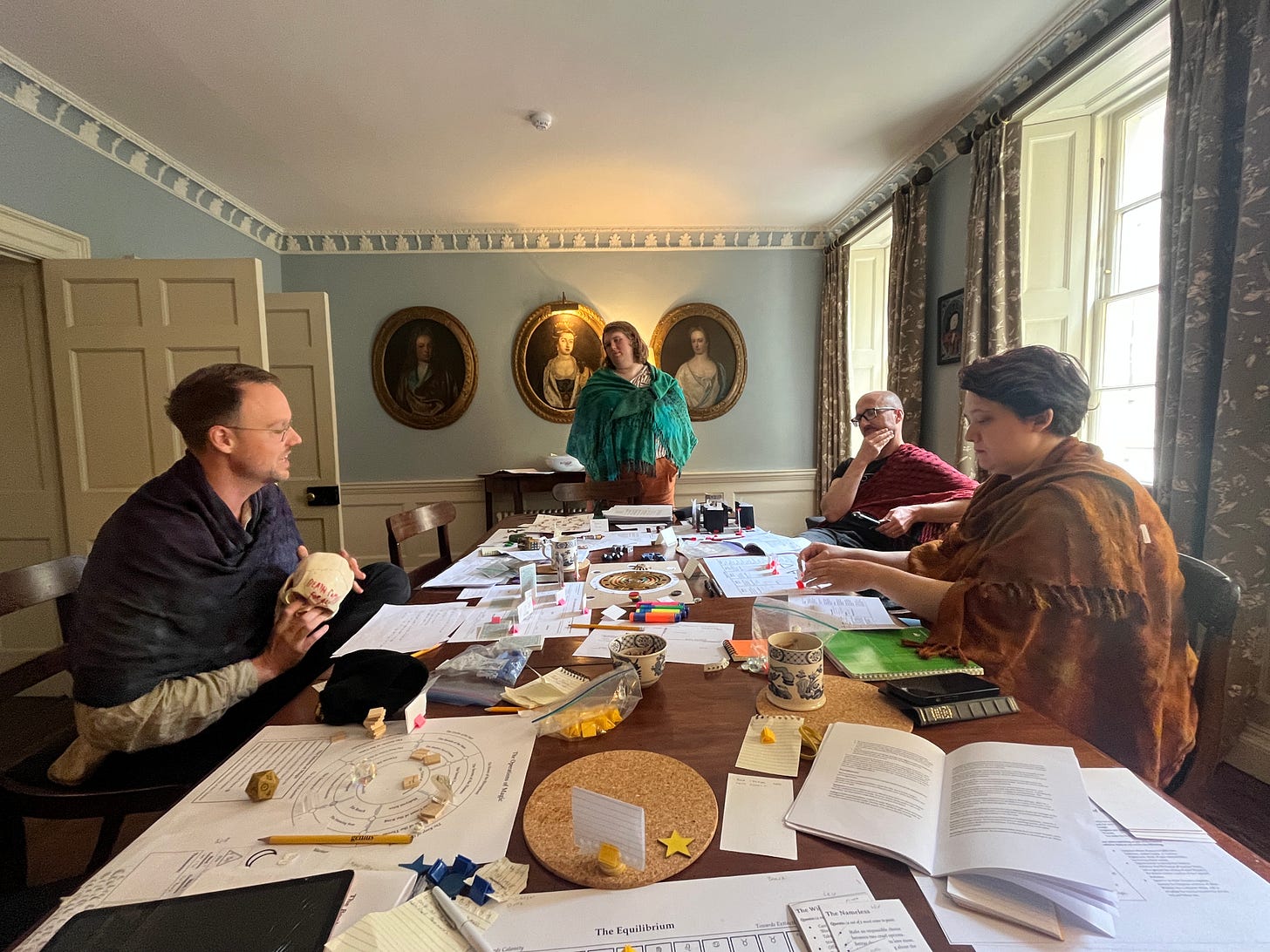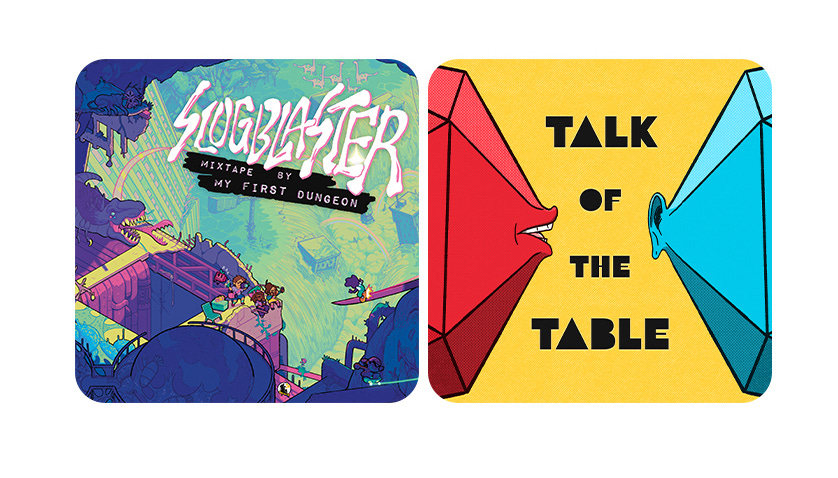The Seven-Part Pact is an overwhelming game. And that’s kind of the point.
Between its seven 30-page codexes—each containing their own domain-specific mini boardgame for each of the seven wizards—and the gargantuan 200+ page Grimoire of world-altering spells, The Seven-Part Pact borders on antagonistic to the idea of internalizing its labyrinthine rules. And I believe it is that inevitable submission to an incomplete understanding that reinforces the very themes of the game and makes it all the more fun to play.
The Seven-Part Pact revels in its consequences. Every action ripples around the table and around the world of Isha. It’s a game with seven GMs that will never need anyone to inject more tension into the game, the simple act of playing will generate more tension and drama than you could ever want. Being “prepared” as a player in this game is not about reading every page of the Grimoire or understanding every wizard’s mini-game. It’s about being open to creating the messiest characters and engaging with the subject matter as fully as possible. The Seven Part Pact challenges players to look at the “Lines” of safety tools not as things that are off the table, but rather as a cliff we will walk up to together in order to gaze over the edge, and in the process play in the borderlands of our comfort. And, in doing so, find a greater understanding of the lines themselves.
I feel it important to note that this article is only a fragment of my thoughts on this singular game. To fully describe The Seven-Part Pact to the uninitiated or share the totality of my thoughts on this game would require a treatise rivaling the source material in length. So if you feel like you’re missing context, you probably are! I’d encourage you to read the excellent articles from Kieron Gillen, Quinns of Quinns Quest, and Dr. Emily Friedman that reflect on their thoughts about the recent playtest in which we all participated, or to go to Jay Dragon’s Patreon and download the complete text to The Seven-Part Pact for only a few bucks. Otherwise, simply let the feeling of barreling forward with unearned confidence wash over you in order to approximate the joy of playing this game. It’ll be fun, I promise.
The Seven-Part Pact is a game about seven all-powerful wizards each in charge of a singular domain—death, fate, war, nature, The Devil, etc.—meeting up every month to bicker about the direction of the world and the nature of magic itself. In this game, Wizards must be men—everyones favorite not-so-hidden joke is realizing the “pronouns” section of your character sheet is already filled in with “he/him.” The game explicitly deals with misogyny and transphobia and invites the players to grapple with those concepts as the very people enforcing—and responsible for—those norms.
A typical play session consists of one month of time where each wizard has four actions they can do, one for each week. So despite being an all-powerful man with a laundry list of responsibilities, you only get four actions to attempt to get everything done. Spoiler alert: you never will. Four actions to deal with your ever-imploding domain-specific minigame, to maintain the relationships with your key companions like your apprentice or your wife, to manage your sanctum and the people you’re responsible for, to cast works of great magic whose effects will be felt across Isha, and to alter the position of the very stars to minimize or change the impact of cosmic forces. Not to mention that one of your actions is almost always taken up by attending the monthly Wizard Moot to report on the state of your domain and argue with the other wizards about the state of magic and your responsibilities as men.
And I haven’t even mentioned the King’s birthday…
Without enough time to possibly deal with all of your own affairs, it makes sense that pretty much every wizard is relieved to completely ignore the machinations and concerns of the others, even though that ignorance will almost certainly fuck with every other wizard’s domain in unexpected ways. After playing in three different playtests for around 50 total hours of play I still have absolutely no idea what the Mariner’s mini-game is all about and, frankly, I’m too busy dealing with the Gates of Death or manipulating destinies to ever learn.
All of us remained willfully ignorant of the intricacies of each other’s mini-games and we moved through play like petulant and destructive children, selfishly focused on only our own overwhelming list of tasks. Occasionally, we’d turn to acts of magic—which are both highly restrictive while also being nearly unlimited in power—to accomplish in one spell what would otherwise take weeks or months of time. And with each spell we would unintentionally wreak havoc on all the other wizards and their domains. In a game that explores misogyny and toxic masculinity, what could be more on-theme than bullishly charging ahead without regard for your co-workers or relationships and casting world-altering magic without ever reading the manual?
Not knowing all the rules turns the act of simply playing into an act of discovery. With every action I took I learned a little more about the inter-connectedness of the world—and if it didn’t impact my wizard I tried my best to ignore it. And every time another wizard made a move I braced myself for how I would be affected. I was just as ignorant as my character which meant that these discoveries happened for me and my Wizard simultaneously. It forced me to stay engaged in the game because every action had a new and unexpected consequence that would radically alter all my carefully laid plans and I would have to improvise, possibly casting some stupidly-powerful spell before reading all the fine print. When there’s simply too much to learn there is joy in being a novice. Especially when you’re trying to pass yourself off as competent.
The Seven Part Pact is not a game for everyone. It is massive in scope and ambition and also in required materials (just look at the state of our massive gaming table during play). But anyone who plays The Seven Part Pact for any length of time is invariably afflicted with the same ailment called Magus Insaniam, commonly known as Wizard Madness. Symptoms include: thinking about the Wizard Game, talking about the Wizard Game, and, for game designers, trying to make all your games more like the Wizard Game. Of all the TTRPGs I’ve ever played, none will stick with me for as long or as fundamentally as The Seven-Part Pact. Even if I never play it again—which would truly be a tragedy—I expect the things I’ve learned from the experience will continue to seep into my life as a creator, as a player, as a producer, and simply as a person.
While it’s true that this is not a game for everyone, for some it becomes everything.
The Seven Part Pact is expected to be crowdfunding sometime in 2026 (or potentially just live in a magical shoebox in Jay’s closet). We’ll surely be covering that campaign if and when it ever happens. But for now, you can download all the digital play materials at Jay Dragon’s Patreon for just a few dollars. I’d HIGHLY recommend you do.
— Brian
💸 Coupon Clippings
Use these codes to score deals on some of our most favorite games and keep an eye out for more coupons coming up in future newsletters.
MFD2025 — 20% off anything in the Mythworks Store (Go grab your copy of Slugblaster!)
MFD20 — 20% off Stewpot from Evil Hat Games
MANYSIDED - 20% off anything from moreblueberries.com (excludes pre-orders)
🗞️ News Worthy
Rainbow Roll Festival announces award winners, including five award wins for Tales Yet Told: 2048AM Voices in the Woods.
Possum Creek and Steve Jackson Games launches Backerkit campaign for Last Train to Bremen by Caro Asercion.
Dr. Emily Friedman, noted actual play scholar, launches a Patreon with additional writing, videos, and more. (Get access to everything at the Free Tier.)
Hellwhalers: Book of Leviathan is now crowdfunding on Backerkit.
🎲 What We’re Bringing to The Table
🎥 Watch: Anatomy of a Mothership Tripanel - RPG Review by Dave Thaumavore RPG Reviews
📚 Read: Kieron Gillen shares his experience playing The Seven Part Pact.
🎧 Listen: Dice Exploder: Afterimage | City of Winter
🎙️ New From The Studio
My First Dungeon: Slugblaster | Session Six (Thursday July 10th)
Talk of the Table with Moss Powers, creator of Hellwhalers (Monday July 27th)
PATREON EXCLUSIVES
My First Dungeon: Slugblaster Talkback (Thursday July 3rd)








There are some fun cooperative hidden info games, but I don't know of another one in which the hidden info is simply because everyone is too busy to share relevant knowledge and learn the other players' mechanics.